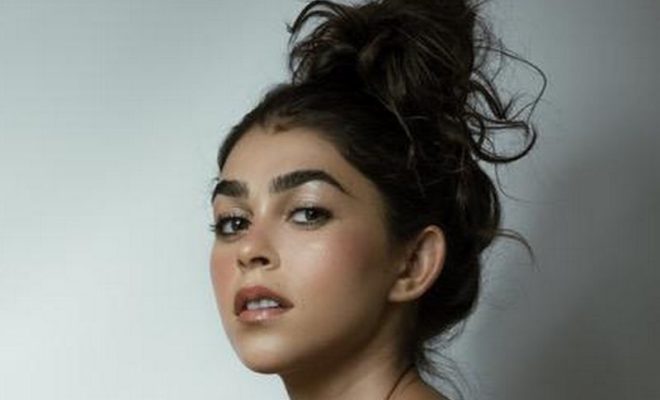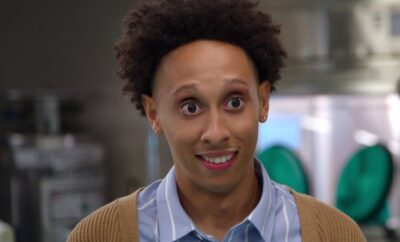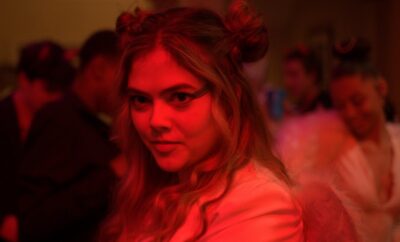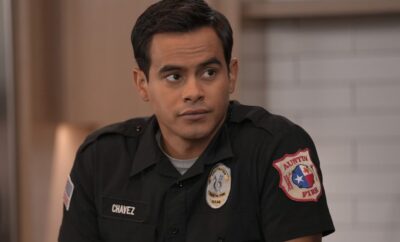
Interviews
Natacha Karam – 9-1-1: Lone Star
By: Jamie Steinberg
Q) Talk about how you became a part of “9-1-1: Lone Star.”
A) The audition came through my agent and my team were really excited about it because it’s very much the niche that I play in – the tough chicks and the ethnicity and diversity and representation kind of stuff. It’s what I’m always looking for. So, when it came through, I was doing a movie in Morocco at the time so I did a self-tape for the two scenes that they had sent me. I taped it and sent it in and then I got a direct offer from them. I actually never met the casting director and producers and had never worked with any of these people before. They thought they had found what they were looking for in me and I was excited about the part. And the time in between having auditioned for it and being offered it I remember reaching out a couple of times to my agent, which I never usually do, and asking if they had heard anything because I thought I was so right for the part and couldn’t believe that I hadn’t gotten a callback for it. I went from handing in the tape and hearing absolutely nothing to just getting a straight offer, which is usually not how the process works. I was really surprised. I was like, “So, when do I have to go in and do my test? When do I have to do the chemistry read?” They were like, “No, no. It’s a straight offer.” The part is yours if you want it. And I was just so excited about it. I do a lot of military stuff and had done a few military things in a row. I still want to do badass parts and service women, but I was kind of excited to do something a little bit different. So, this was a nice fit for me.
Q) How was the role of Marjan Marwani originally described to you?
A) Her name wasn’t originally Marjan. I think it was Layla. Her name changed a couple of times before it became Marjan, but when I originally auditioned it was Yasmine maybe. Then, I read it and was like, “Oh, this is definitely something I want to do.” I think any time I get the chance to present something that hasn’t necessarily been seen or break a stereotype or make question their beliefs or challenge people I will jump at the opportunity. I don’t think people realize how influential Hollywood and movies and TV and media is and how much it can help form peoples’ opinions on things. So, when you’re on the positive side of that it’s amazing. I love the opportunity to turn some negatives into positives and change peoples’ opinions, which is what I like doing with these kinds of unique characters that I’ve been doing for some time.
Q) What have you found challenging about your portrayal?
A) I think, for me, it’s a collaborative effort with the writers, directors and myself. I think my challenge is to not make her a cliché, to make her more than her religion. Because any human being is more than just that. It’s a part of them and it takes many parts to make a whole. Her religion is only part of her identity. Her hijab is only one part of her. So, the challenge is to constantly remind the audience and ourselves that she is a three-dimensional human being and that’s just one of her attributes. As a human it’s one of the most important things, but it’s not the ultimate thing that describes her. People exist three dimensionally and it’s just a part of her and the challenging part is to remind ourselves and the audience that she is more than that – to see her as a human and a firefighter and as a woman and a Muslim, but not see her as any of those singularly. To see her as a friend. To see her as a family member. To see her.
Q) We loved seeing the discussion of her hijab in last week’s episode.
A) I think naturally because of who she is (how she exists and where she exists) it will come up in conversation again. But like I said, the challenge is avoiding it being the driving force of all Marjan’s themes and all interactions. It’s just a part of who she is. There is no shame there. She is very proud to be a Muslim woman and she’s very proud of her choice to wear a hijab. It’s not a choice that everyone has to make. Like she said in last week’s episode, that’s her choice about the dentist who chose not to wear it. There is no prejudice, but her choice is to wear it. Naturally, it will come up in conversation again. It depends on what context it comes up in if we learn something new or different about it.
Q) What kind of physical prep went into your portrayal of a firefighter?
A) We have spent a lot of time in firehouses and in LA the fire chief is there on set every day. He is in the writers room and helps them make realistic choices of what real firefighters would do and what he used to do. We have real firefighters driving the truck and the engines on set. They are firefighters who are still working and on their days off they come in and do that. They help train us. I’ve been to three or four firehouses in LA and went on calls with them. I’ve seen how they work and operate behind the scenes. All that stuff really influences accurate portrayals. We want to honor these men and women who risk their lives and help selflessly that we actually know personally now. So, it feels even more important to us to accurately represent them so it’s correctly handling equipment, staying physically fit, the mannerisms and behavioral traits and the kind of banter that they have. These are things we soaked up by being in their presence and I think there is no better way to learn than to immerse yourself into that world, which is what all of us have tried to do and luckily had the chance to do. Firehouses have been very welcoming.
Q) Were you familiar at all with any of your costars before working with them on the show?
A) I mean, it would be strange if I didn’t know who Liv Tyler and Rob Lowe were. [laughs] I hadn’t worked with either of them before, but of course I knew who they were and are. I feel very lucky to call them costars and to get to work with them. Brian [Michael Smith] is also incredible. I didn’t know him before the show, but we met during filming. We really quickly became close friends. Brian and I very much get along and he’s been a blessing as a friend and as an actor. I learned so much from him as a human being. If anything, the costar that has had the most impact on my life has indeed been Brian Michael Smith.
Q) Since you are a part of social media, what kind of fan feedback have you received so far to series?
A) I think a lot of people are really responding to Marjan. There has been a lot of positive outpouring. It’s funny how much attention the show got before it even aired from original “9-1-1” fans. I think my fans from my previous show have been so kind and so supportive and so happy to see me back and in another badass role. It’s nice to get to show them that because for a little while I wasn’t on a show. I was doing little things here and there. Now, I get to have the whole excitement and share it with the fans every single week, being on TV and being able to tweet with them and read their responses. I think it’s really special. I think a lot of people don’t understand how much actors appreciate having fans and having support. And the fact that people go out of their way to encourage and support and appreciate and love and entertain us – there might be no response or we might not see everything, but we do try and respond because it hits home every single time. These are people who are out there just trying to love us and we love you guys. It’s crazy to me! It’s fucking crazy to me that people are out there making collages of my face and quoting my words! For me, it’s just important to remember to be as positive and as real of an influence as I can be. I take social media really seriously. The content that I choose to put out there of myself and the things I say and the things I don’t say and the things I show and I don’t show…Social media is a hugely influential place and I had to think that I was portraying anything other than something that I think is important or fun or true to me in whatever way I exist in this world. We, as actors, do have influence over people and I think it’s important to acknowledge that and be aware of that.
Q) How do you shake off a long day of filming?
A) I journal a lot. Also, boxing. I do a lot of exercise. I’m a very active person. I sometimes workout at 4 or 5 AM before I get to set or 6 AM. If not, I’ll work out when I get home from set. Last night I was in the gym from 10PM to 11PM. I didn’t get home until after midnight. Yeah, I think physical activity and exercise keeps me kind of in shape and shakes off the day and helps my own reality sink back in rather than a character’s reality. There needs to be some kind of separation between work and play and work and self.
Q) What do you think it is about “9-1-1: Lone Star” that has made it a fast fan favorite?
A) I think we’re giving lots of different people the opportunity to see themselves and I think it’s really important because when you can see yourself you can accept yourself, especially when you are shown in a positive light. People are looking to see themselves accurately represented and the absence of it is almost like an erasing of you. So, to get to see yourself – you don’t feel wanted, warranted and accepted – erasing certain groups of people on TV is so powerful and has such a detrimental effect on people that the opposite is also true. When you see yourself…When you see yourself in empowered positions, when you see yourself in human light, when you see yourself in a lovable light, when you see yourself in a way that you recognize on TV – I think it really makes a difference to people. You feel heard, you feel known, you feel accepted and I think we’re covering so many demographics and groups with our portrayals of this kind of hand-picked multi-colored multi-cultural…We’ve got everything for people to see themselves in and I think it’s resonating with people. And I think that’s why it is attracting so many people so quickly. Straight white hetero worlds on TV is not an accurate representation of life. There is so much more than that happening in any corner of the world. There are so many different kinds of people existing and there is nothing wrong with any of those things. There is just also more than that. Not everyone is straight. Not everyone is white. Not everyone is of a particular gender identity that you want them to be. Not everyone is of one faith or any faith. People get to see many things in this show and also, it’s Ryan Murphy world. It’s fun, quirky, tongue-in-cheek, outrageous and it’s great escapism. It’s good TV. It’s great entertainment. I think that’s important as well – to not forget at the end of the day we’re entertaining.
Q) Is there anything else we should be sure we share with our readers about your time working on the show?
A) I think the most important thing is that we’re trying to change a narrative that has been in many different ways for many different characters. We’re trying to change the narrative that has been told about ethnic groups and religious groups and minorities in any ways. We’re trying to do something different with it in power, instead of disempower. I think the whole spiel I gave about being seen is one of the most important things that I have taken from “Lone Star” and the thing that I hold closest to me when working on the show. It’s just imagining all of the people who are seeing themselves for the first time or who feel empowered by our portrayal of similar versions of them and their struggles with their identity or sense of self. The world is a very colorful place. It’s not all black and white.
Q) What would you like to say to everyone who are fans and supporters of you and the work you do?
A) Thank you, first of all. Thank you so much. I’m overwhelmed and inundated with gratitude. Keep watching and keep supporting and I’ll keep trying to do my best to be the best I can be.





You must be logged in to post a comment Login